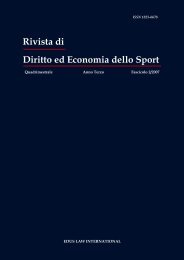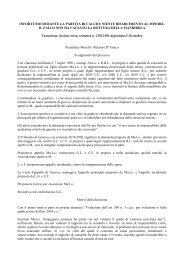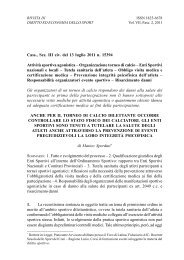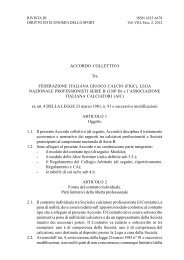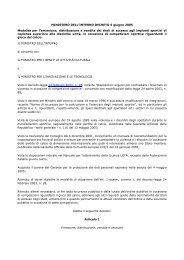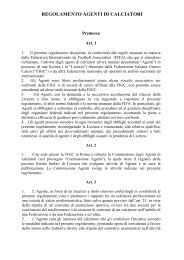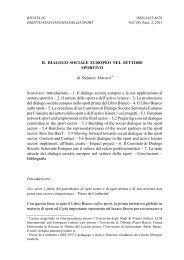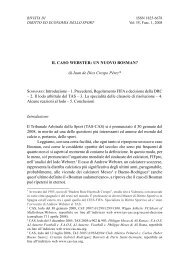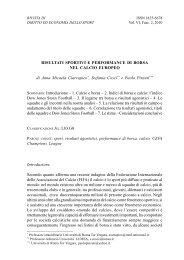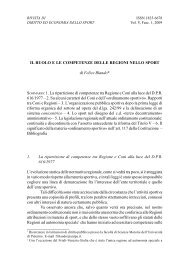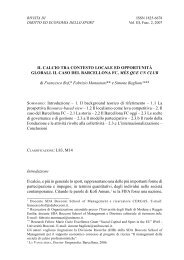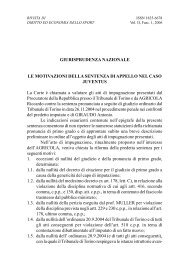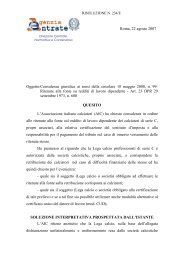You also want an ePaper? Increase the reach of your titles
YUMPU automatically turns print PDFs into web optimized ePapers that Google loves.
28 Wladimir Andreff<br />
contest. There is no vertical mobil<strong>it</strong>y of teams up to a global level. The only team<br />
mobil<strong>it</strong>y which occurs in a closed league is horizontal and geographical. A team<br />
can move from an American c<strong>it</strong>y to another one w<strong>it</strong>hin a same major league. On<br />
the contrary, European football is open upwards for clubs to qualify for an<br />
international contest w<strong>it</strong>h the UEFA Champions League and the UEFA Cup which<br />
are broadcast at global level.<br />
In an open league system, the club content of a championship changes<br />
from season to season. A hierarchical organization is maintained by means of a<br />
promotion-relegation system. As to the principle, a club can move upwards from<br />
the lowest local amateur contest to a nation-wide professional championship and<br />
eventually qualify for European Champions League. Or a club can fall down the<br />
ladder. Its route in the hierarchy only depends on <strong>it</strong>s sporting performance. Club<br />
mobil<strong>it</strong>y is vertical from league 1 to league 2 to league 3, etc. (or the other way<br />
round); usually, there is no geographical mobil<strong>it</strong>y. The util<strong>it</strong>y function of a club in<br />
an open league is win-maximization in order to be promoted (or avoid relegation)<br />
under a budget constraint which consists in being in the black. 35 In fact, all clubs<br />
invest in player talents before the beginning of season in view of winning the<br />
championship; but all clubs cannot be champions or well ranked at the end of<br />
season and, therefore, gate receipts and TV revenues will not cover ex post payroll<br />
costs in loosing clubs. Sporting compet<strong>it</strong>ion prevails over economic compet<strong>it</strong>ion in<br />
an open league. The latter also calls for some regulation to sustain fan interest, but<br />
much less than in a closed league for two reasons. Firstly, relegation keeps the<br />
weakest clubs out of the league at end of each season by ‘sending’ them down in a<br />
lower league, and promotion adds the best clubs from a lower league to the upper<br />
league. Thus, the promotion-relegation system operates as a self-regulation<br />
mechanism which restores compet<strong>it</strong>ive balance season after season. Secondly, the<br />
fan interest in a championship is maintained up to the end (contrary to a closed<br />
league) by the race to be promoted or relegated. The only games w<strong>it</strong>hout too much<br />
interest are matches between middle ranked clubs by the end of season because<br />
they are no longer threatened w<strong>it</strong>h relegation and no longer have the chance to be<br />
promoted.<br />
The ultimate objective of major European (for instance football) clubs is<br />
to qualify as regularly as possible for international (European) contests and this<br />
has transformed them into real multinational businesses or companies. Such<br />
statement may seem paradoxical since <strong>it</strong> is not possible to markedly globalize a<br />
club’s basic product which is a match offered in a stadium (moreover <strong>it</strong> is a joint<br />
____________________<br />
35<br />
In practice, a number of European professional clubs are actually in the red. In particular,<br />
several famous Italian football clubs. This does not mean that there is no budget constraint but<br />
that such clubs meet a problem of bad governance. On this point see W. ANDREFF, French Football:<br />
A Financial Crisis Rooted in Weak Governance, J. of Sp. Econ., vol. 8, n. 6, 2007, 652-61; W.<br />
ANDREFF, Governance issues in French professional football, in J. Garcia, S. Késenne, P. Rodriguez,<br />
(eds.), League Governance, Ediciones de la Universidad de Oviedo, 2007d, 55-86; W. ANDREFF,<br />
Equilibre compét<strong>it</strong>if et contrainte budgétaire dans une ligue de sport professionnel. Vers une<br />
meilleure gouvernance du football français, Rev. Econ., n. 2, 2009, forthcoming.



